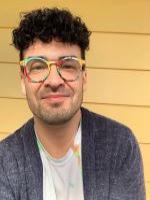Empower Student Storytellers to Reimagine Iconic America
,
Colorado Convention Center, Mile High Ballroom 2C
Presenters


Session description
Purpose & objective
The purpose of this session is to introduce educators to the free media literacy and digital storytelling resources available to support use of PBS's Iconic America in the classroom. The Iconic America series invites viewers to think critically about historical icons, sites, and themes that impact how we view America. The teaching and learning resources that will be presented in this session empower students to think critically about icons, sites, and themes in their own communities.
Educators who attend this session will leave with the tools to conduct thoughtful inquiry around digital stories, with Iconic America as a model but with additional historical and documentary-style PBS content shared as additional options. Teachers will have a clear understanding of the kinds of questions and discussions students can have around this type of content to inspire critical thinking and deeper learning.
Secondly, educators will develop a level of comfort with digital production, especially mobile and handheld video production through which any student can capture, edit, and share community stories in response to the prompt issued by a series like Iconic America.
Finally, educators will collaborate to develop the beginnings of their own unit plan leveraging the discussion and storytelling resources that will be shared. Educators will understand the basic model that relies on initial media viewing, critical thinking, and discussion, followed by inquiry and a design process that concludes with student-led media production and digital storytelling.
Outline
I. Introduction and project background
The first phase of the session will feature speaker introductions and a brief overview of how public media stations play a role in education. We will offer a brief screening of Iconic America to ground our presentation in an appreciation of media, storytelling, and critical inquiry. Participants will be taken through a brief example of the type of inquiry that students participate in during the project.
II. Project overview and case studies
As we move participants through their mock inquiry, we will engage in a virtual tour of the project pathway, showcasing the materials and learning invitations that we have built in for students, and highlighting all of the customizable elements that educators can use to adopt the project for their classrooms. We will stop along the way to showcase examples from our one-year pilot with our Iconic Michigan Teacher Fellows, and we will end by screening several student-made films.
III. Exploration and workshop time
The second half of the session time will be spent in hands-on mode. Participants will be given full access to the project materials, including the educator guide, student handbook, and additional lesson plans and media. We will guide educators through thinking about how this project could play out in their classroom, what sorts of topics their students might be interested in learning about, and what community partners they might engage to support their students.
IV. Pitch!
One of the activities in the project guide is a project pitch, which we will model with educators in the room to have them "pitch" their project ideas and receive quick feedback. We will end with these pitches so that participants have an opportunity to share, make connections, and celebrate what they've started.
Supporting research
Garcia, A. et al (2014) Teaching in the Connected Learning Classroom. Irvine, California: Digital Media and Learning Research Hub.
Jenkins, H., et al. (2009). Confronting the Challenges of Participatory Culture: Media Education for the 21st century. Cambridge, Massachusetts: The MIT Press.
Ito M. et al (2019). Hanging Out, Messing Around, And Geeking Out, Tenth Anniversary edition: Kids Living and Learning with New Media. Cambridge, Massachusetts: The MIT Press.
Ito, M., et al. (2013). Connected Learning. Irvine, California: Digital Media and Learning Research Hub.
Vander Ark, Todd and Schneider, Carri. Deeper Learning for Every Student Every Day. A report from the William and Flora Hewlett Foundation.
Madden, M., & E. Rood (2023). Gen Z in the room: Making public media by and with youth for the future. Joan Ganz Cooney Center at Sesame Workshop.
Session specifications
Laptop: Chromebook, Mac, PC
Tablet: Android, iOS, Windows
Knowledge Constructor
- Students curate information from digital resources using a variety of tools and methods to create collections of artifacts that demonstrate meaningful connections or conclusions.
- Students publish or present content that customizes the message and medium for their intended audiences.
 Return
Return Explore and create: Deep-dive Creation lab
Explore and create: Deep-dive Creation lab  Trips and Tours
Trips and Tours Preregistration Required
Preregistration Required